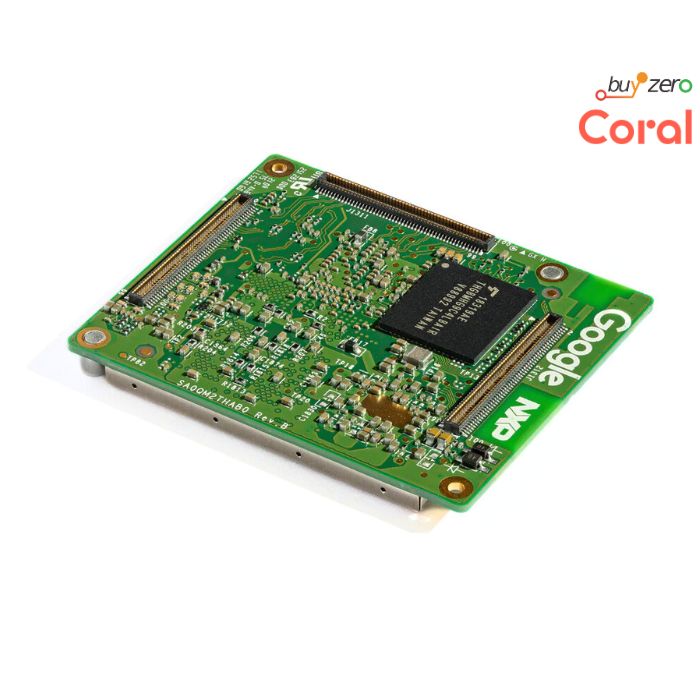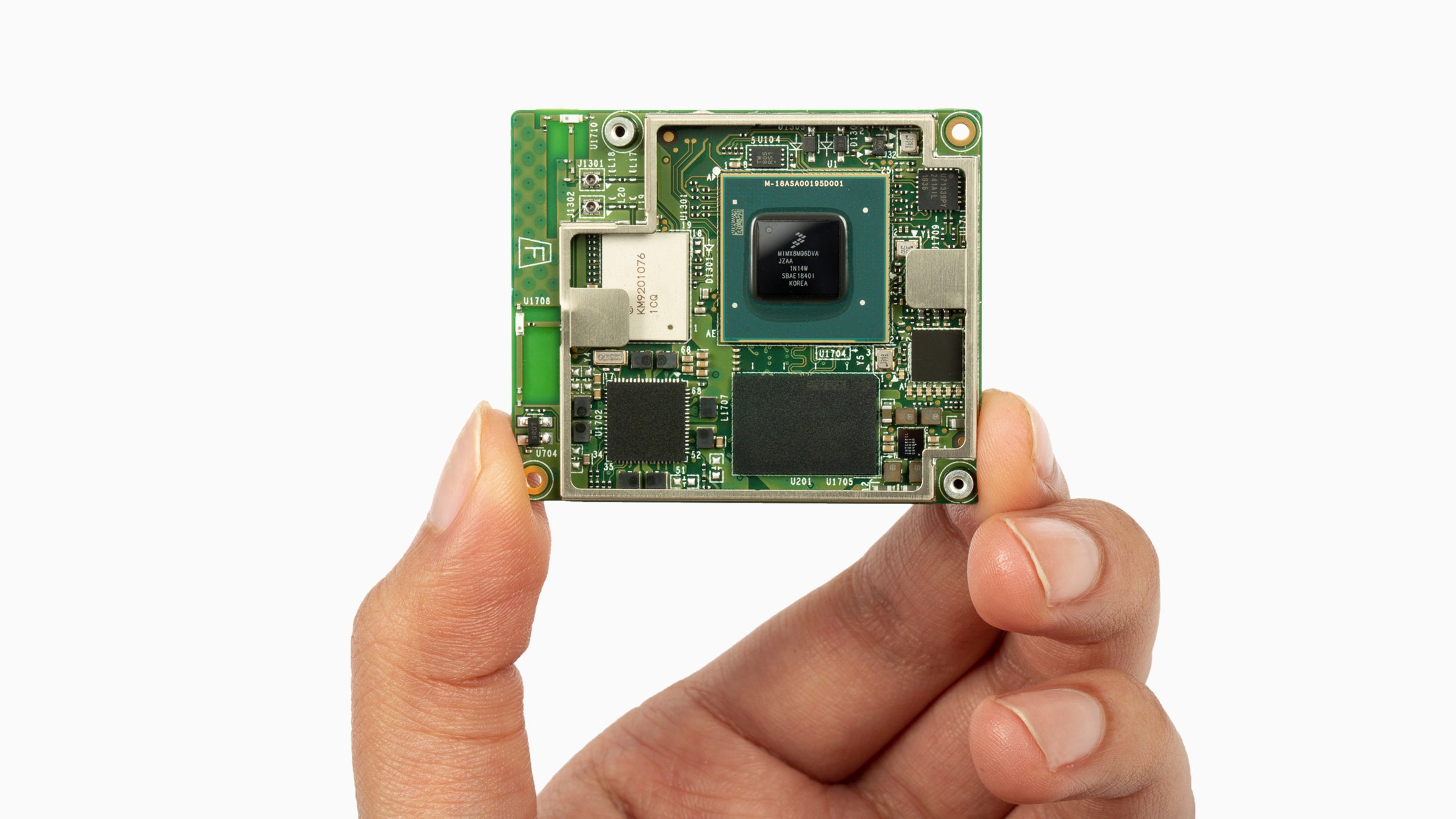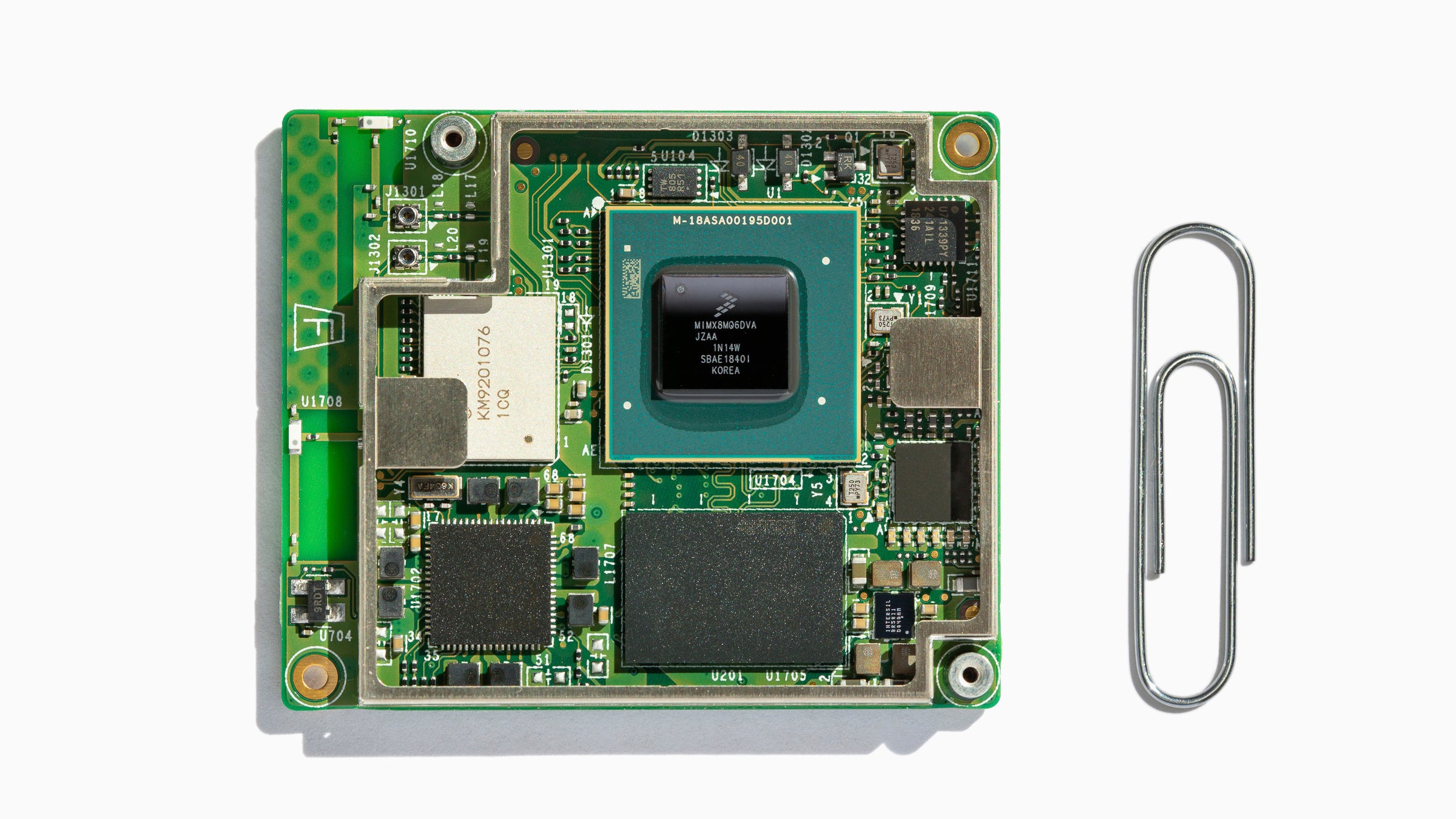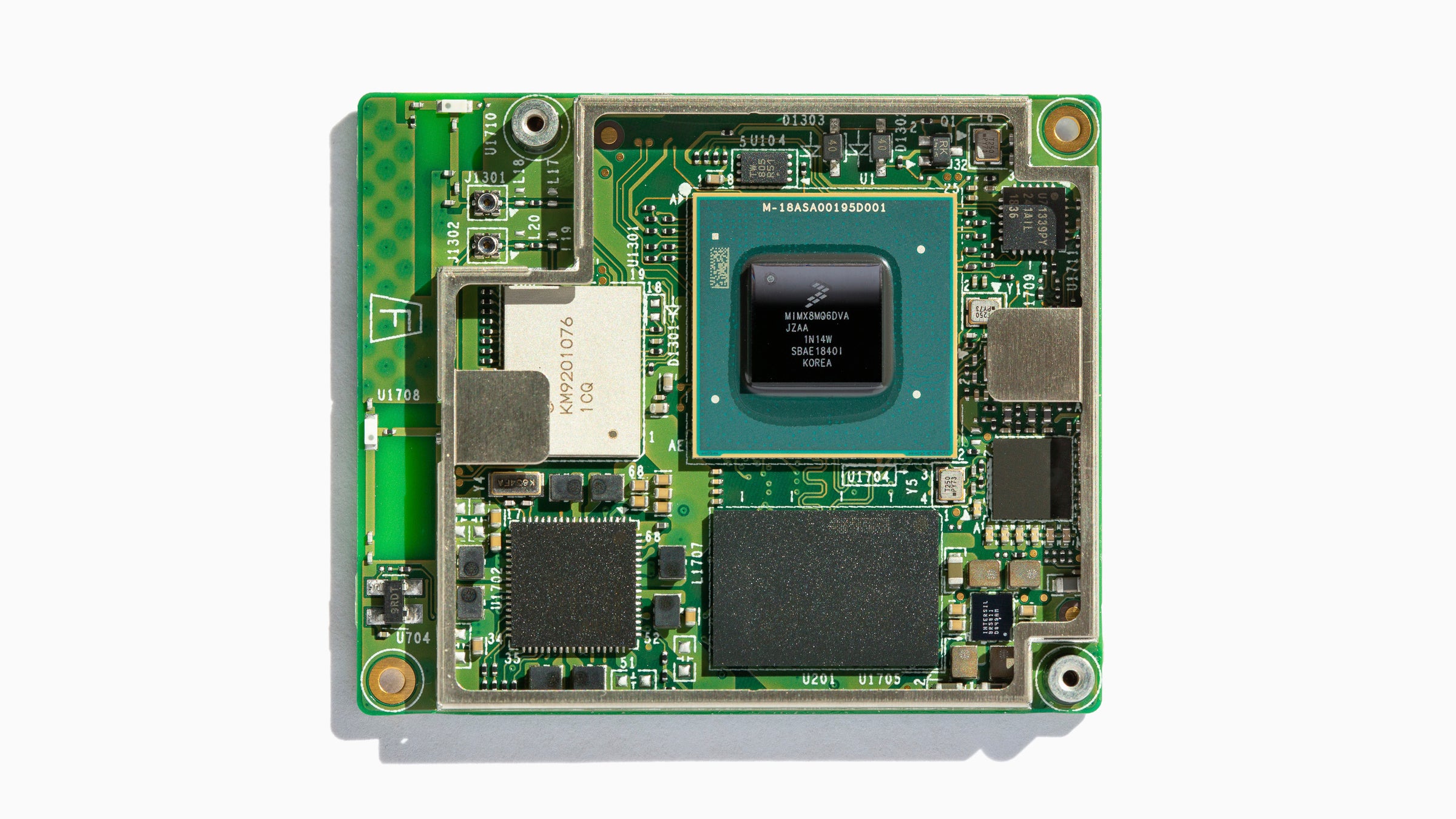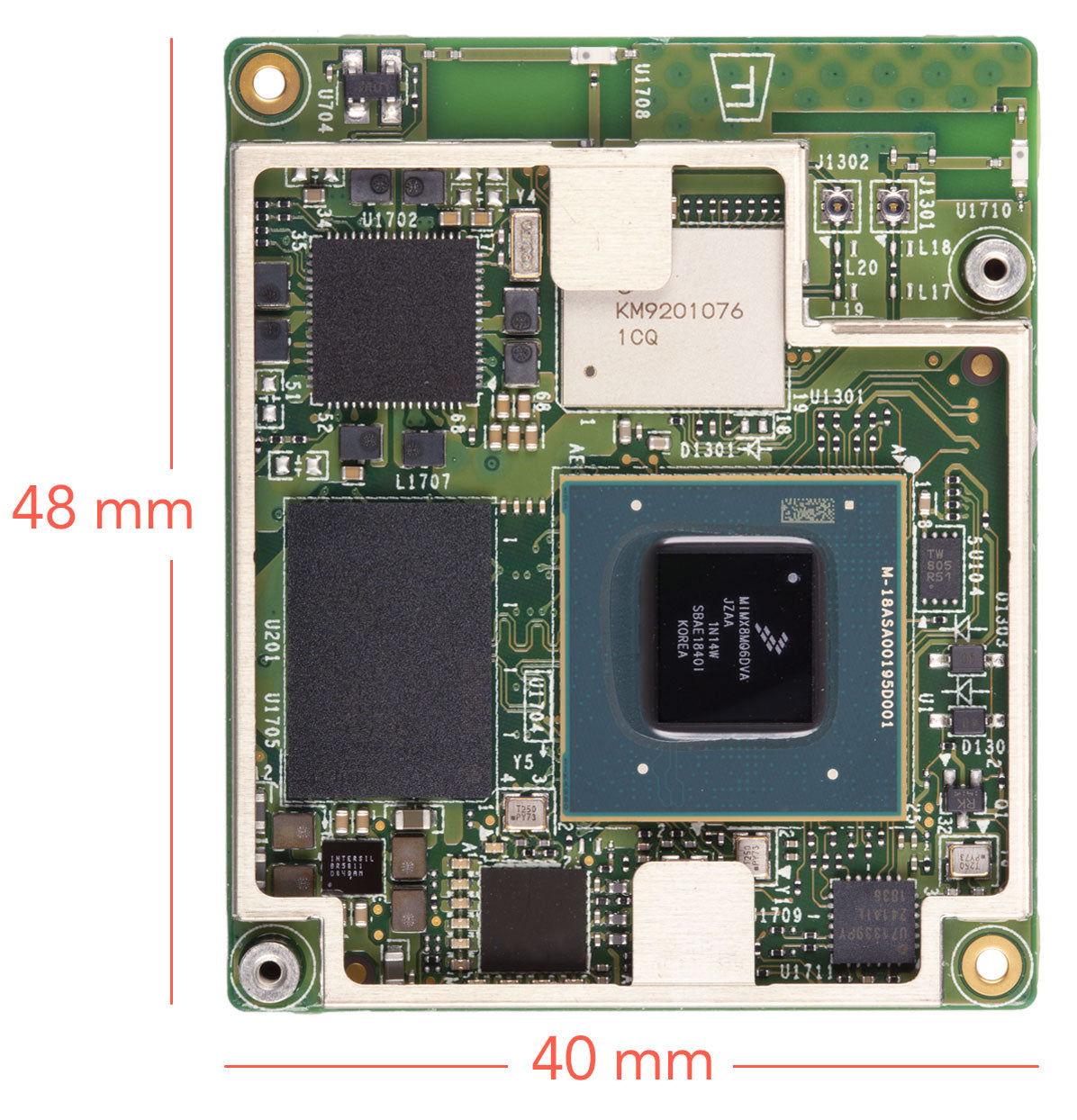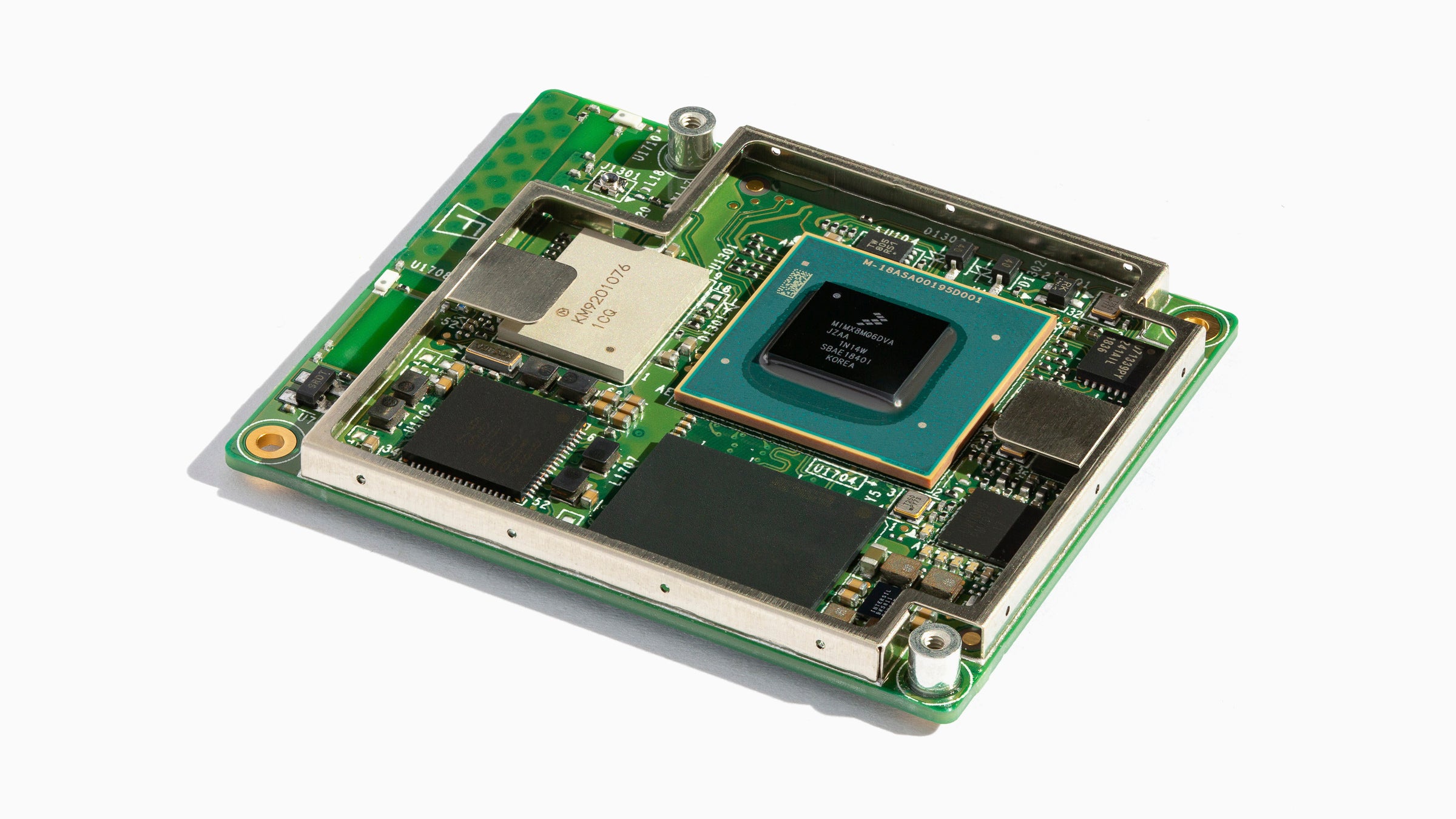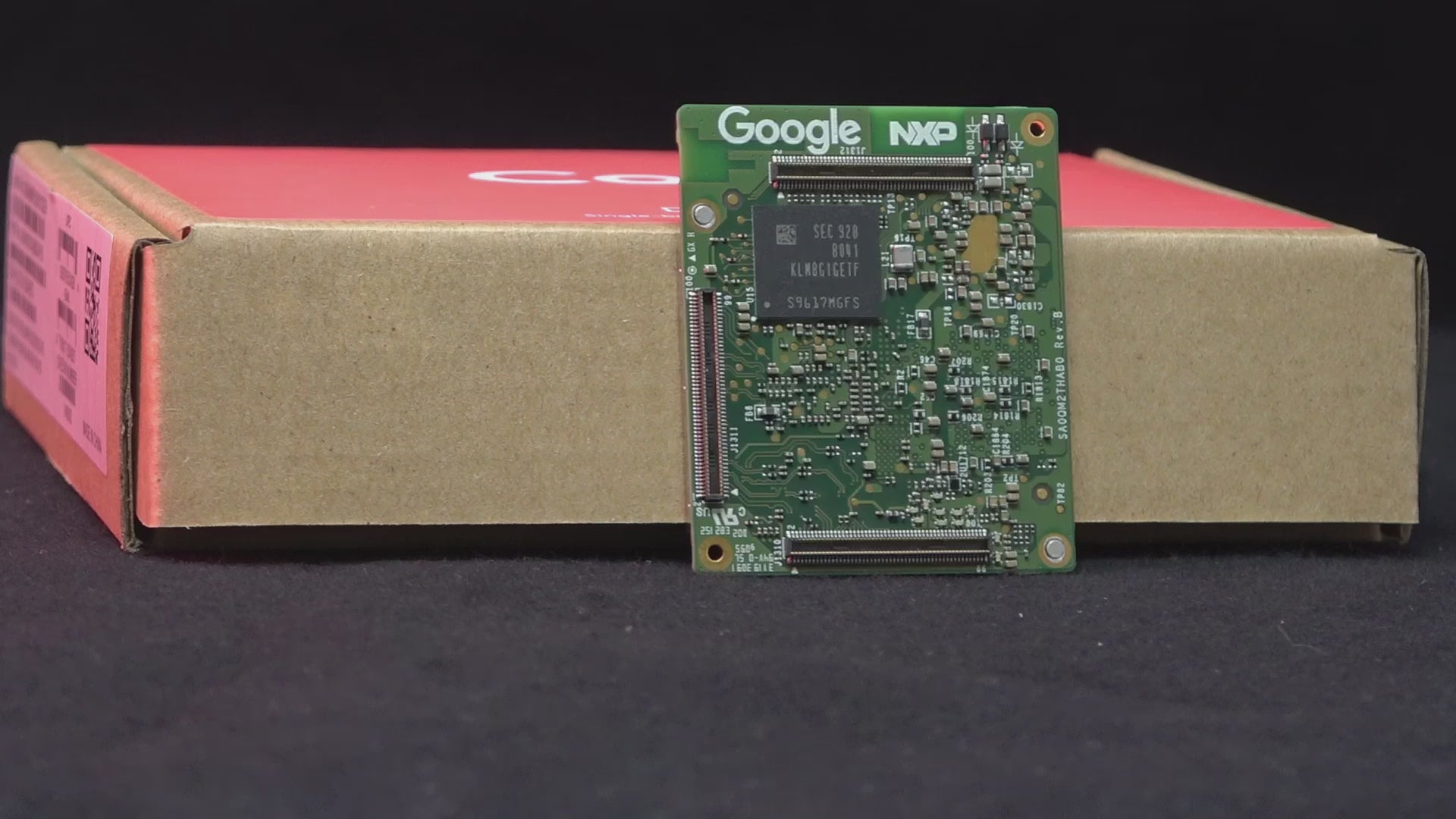Das Google Coral System-on-Module (SoM) ist ein komplett integriertes Systemmodul für hardwarebeschleunigte Machine Learning Anwendungen, bestehend aus CPU, GPU, Edge TPU, Wi-Fi, Bluetooth, und Speicher in nur 40mm x 48mm Größe.
Dieses Modul kann einfach in Ihre eigene Hardware (und Anwendung) eindesigned werden. Es ist beispielsweise der Kern des Coral Dev Boards (in der 4GB Variante).
Ihre Vorteile:
- Das Design eines passenden Trägerboards für Ihre machine learning Anwendung ist deutlich kosteneffektiver, und schneller.
- Sie erhalten eine aufeinander abgestimmte Hardwareplattform mit guter Softwareunterstützung.
- Durch die drei Speichervarianten können Sie die für Ihre Anwendung passendste wählen - Ihren Kunden Optionen anbieten, oder Kosten optimieren
Tipp: wir bieten Ihnen Hardware- und Softwaredesign aus einer Hand, rund um Coral sowie die Raspberry Pi Plattform. Nehmen Sie bei Interesse für ein unverbindliches und kostenfreies Erstgespräch bitte Kontakt mit uns auf.
Bitte kontaktieren Sie uns ab 100 Stück Bedarf für Mengenrabatte.
Hinweis zur Verfügbarkeit / availability
Coral 1GB SoM sofort verfügbar, 2GB SoM und 4 GB SoM auf Anfrage.
Wir führen auch den Coral USB Accelerator, sowie das Coral Dev Board Mini. Für besonders hohe Leistung empfehlen wir das Coral Dev Board 4 GB zu nutzen, während das Dev Board Mini vor allem für Low-Cost Lösungen sinnvoll ist.
Coral SoM
Das Google Coral SoM enthält neben der EdgeTPU die wichtigsten Komponenten eines embedded-PC:
- NXP i.MX 8M SoC (CPU + GPU)
- Google Edge TPU ML accelerator
- Crypto-Koprozessor
- Wi-Fi + Bluetooth
- 8 oder 16 GB eMMC
- 1, 2, oder 4 GB LPDDR4
- USB 3.0 Schnittstelle
- Gigabit Ethernet Schnittstelle
- HDMI und MIPI-DSI
- MIPI-CSI-2
- bis zu 95 x GPIO (inklusive SPI, I2C, PWM, UART, SAI und SDIO)
Sie können im Prototyping-Stadium Ihre Anwendung mit Hilfe des 4GB Coral Development Boards umsetzen, das auf diesem SoM Modul basiert - und anschließend einfach ein eigenes Hardware-Design realisieren, das für Ihre Anwendung optimiert ist.
Die Edge TPU
Mit der Edge TPU können Tensor Flow Lite Modelle schnell und energiesparend für Inferenz genutzt werden.
Ein besonderer Vorteil dieser Lösung: Ihre Daten bleiben lokal. Das hilft bei der Latenz, und natürlich beim Datenschutz! (Und entsprechend der Befolgung der relevanten Gesetze, beispielsweise der Datenschutz-Grundverordnung (DSGVO), auf Englisch GDPR genannt).
Google nutzt zunehmend künstliche Intelligenz (AI) und maschinelles Lernen (ML) um seine Dienstleistungen zu realisieren. Dazu entwickelte es für seine Rechenzentren spezialisierte Prozessoren namens TPU ("tensor processing unit"), die die Algorithmen mit dem TensorFlow Framework schneller und energiesparender ausführen können. Beispielsweise wird Google Maps durch von Street View aufgenommene Straßenschilder verbessert, die mit Hilfe eines auf TensorFlow basierenden neuronalen Netzes analysiert werden. Der Clou: TensorFlow kann einfach in Python programmiert werden.
Die Edge TPU unterstützt das TensorFlow Lite Framework. Die Edge TPU kann bis zu 4 Billionen Rechenoperationen pro Sekunde mit nur 2 W Verbrauch durchführen. TensorFlow Lite ist eine abgewandelte Variante von TensorFlow, die speziell auf den Bedarf mobiler Endgeräte und von embedded devices angepasst wurde. Viele TensorFlow Anwendungen lassen sich auch in TensorFlow Lite realisieren.
Technische Daten Coral SoM (System-on-Module)
NXP i.MX 8M SoC
- Quad-Core ARM Cortex-A53 (@1.5 GHz, 64-bit ARMv8-A) + Cortex-M4F
- Vivante GC7000Lite GPU (supports Vulkan), 32 GFLOPs 32-bit or 64 GFLOPs 16-bit
- 4Kp60 HEVC/H.265 main und main 10 decoder
- 4Kp60 VP9, 4Kp30 AVC/H.264 decoder (benötigt volle Systemleistung)
- 1080p/60fps MPEG-2, MPEG-4, MJPEG, H.263 decoder
Speicher
- Flash: 8GB oder 16 GB eMMC (nur 4GB RAM Variante)
- RAM: 1GB / 2GB / 4GB LPDDR4 Varianten
- SDIO Schnittstelle unterstützt Boot von SD Karte (falls in Ihrem Design vorhanden)
EdgeTPU
- Google Edge TPU ML accelerator coprocessor
- 4 TOPS (int8); 2 TOPS pro Watt
- an NXP i.MX 8M SoC via PCIe (Gen2 x1) und I2C/GPIO angebunden
Tipp: die Anbindung via PCIe ermöglicht die maximale Transferrate auf das EdgeTPU Modul, daher ist das Coral System-on-Module insbesondere gut für Anwendungen mit hoher Framerate / hohen Leistungserfordernissen geeignet.
Netzwerk & USB
Das Coral SoM verfügt über folgende Netzwerk-Schnittstellen:
- Wi-Fi 2x2 MIMO (802.11a/b/g/n/ac 2.4/5GHz), Murata LBEE5U91CQ Modul
- Bluetooth 4.2 and BLE (Bluetooth Low Energy), Murata LBEE5U91CQ Modul
- 2x USB 3.0/2.0 Controller mit integrierten PHYs
- 1x Gigabit Ethernet Controller, unterstützt EEE, Ethernet AVB, und IEEE 1588, via RGMII (Reduced gigabit media-independent interface)
HDMI Bildschirm-Schnittstelle
- HDMI 2.0a (Standard-Größe), unterstützt einen Bildschirm mit bis zu 1080p Auflösung
- Hochskalierung & Herunterskalierung zwischen 4K und HD Video (nutzt volle Systemressourcen)
- 20+ Audio interfaces 32-bit @ 384 kHz fs, mit Time Division Multiplexing (TDM) support
- SPDIF Eingang und Ausgang
- Audio Return Channel (ARC) über HDMI wird unterstützt
MIPI-DSI Bildschirm-Schnittstelle
- MIPI-DSI 4 Lanes, unterstützt eine Anzeige, Auflösungen bis zu 1920 x 1080 @ 60 Hz
- LCDIF Display Controller
- Ausgabe: LCDIF oder DC display controller output
Audio
- 1x SPDIF Eingang und Ausgang
- 2x synchronous audio interface (SAI) Module, unterstützen I2S, AC97, TDM und codec/DSP Interfaces
- 1x SAI für 8 Tx Kanäle für HDMI Audioausgang
- 1x SPDIF Eingang für HDMI Arc Eingang
Kamera
- 2 x MIPI-CSI2 Kameraeingänge (jeweils 4-lane)
GPIO-Interface
-
2x UART Schnittstelle
-
2x I2C Schnittstelle
-
2x SPI Schnittstellen
-
16x GPIOs mit Interrupt-Fähigkeit
-
4x PWM Ausgänge
Konnektivität & Schnittstellen: Sonstiges
- 1x uSDHC Interface
- IOMUXC (Input/output multiplexing controller) für Kontrolle der pads
Hinweis: das SoM nutzt einige der SoC GPIOs / Schnittstellen intern, bspw. um die Coral Edge TPU anzubinden. Die hier aufgeführten Schnittstellen berücksichtigen das bereits, und stehen Ihnen uneingeschränkt zur Verfügung.
Sicherheit
- Resource Domain Controller (RDC), supports four domains and up to eight regions
- Arm TrustZone (TZ) architecture
- On-Chip RAM (OCRAM) secure region protection using OCRAM controller
- High Assurance Boot (HAB)
- Cryptographic acceleration and assurance (CAAM) module
- Secure non-volatile storage (SNVS): Secure real-time clock (RTC)
- Secure JTAG controller (SJC)
- Crypto Koprozessor Microchip ATECC608A
Spannungsversorgung
Das Coral SoM benötigt eine Spannungsversorgung mit 5 V, und generiert daraus alle anderen benötigten Spannungen selbst mit einem on-board PMIC.
Leistungsaufnahme des SoM ca.:
- idle: 2.6 W
- idle mit HDMI Ausgabe: 3.0 W
- High performance: 6.2 W
Weitere Informationen
- Abmessungen des Coral SoM: 40 mm x 48 mm x 5.11 mm
- Gewicht: 13 g
- Verbindung zum Trägerboard: das SoM wird mit dem Trägerboard über drei 100-polige Steckverbinder (Hirose DF40C-100DP-0.4V) verbunden.
Software-Unterstützung
Mendel Linux
Mendel Linux ist ein von Google entwickeltes Debian-Derivat, speziell für die Coral Plattform. Auf dem SoM ist ab Werk ein Bootloader vorinstalliert, Sie müssen Mendel Linux manuell installieren. Hier finden Sie eine Anleitung dazu.
Mendel Linux nutzt Debian's upstream binary packages, um möglichst hohe Kompatibilität zu bewahren, und Sicherheitsupdates zeitnah zu ermöglichen. Es unterstützt aktuell nur die Coral Dev Boards (auch als "enterprise" oder "phanbell" bekannt) und die Coral SoM Module (System-on-Module).
TensorFlow Lite
Das Coral System-on-Module unterstützt die Ausführung von (kompilierten) TensorFlow Lite Modellen auf seiner EdgeTPU.
Das Coral System-on-Module unterstützt AutoML Vision Edge, um Modelle für Bild-Klassifikation (image classification models) schnell zum Einsatz bringen zu können.
Empfohlenes weiteres Zubehör:
Potential für industrielle Anwendungen & Consulting
Die Google Coral TPU & TensorFlow Lite sind eine revolutionäre Produkt-Plattform für machine learning Anwendungen! Damit werden embedded Lösungen möglich, die beispielsweise Probleme mit Werkstücken erkennen können, Verkehrssituation erkennen können, und vieles mehr.
Das Coral SoM (System-on-Module) eignet sich wenn Sie eine eigene Hardware-Lösung anstreben, die höhere Anforderungen an machine-learning Inferenz stellt, und gleichzeitig eine optimierte Leistungsaufnahme erfordert.
Als Alternative zu dem SoM, das eine eigene Plattform bietet, gibt es von Coral by Google auch PCI Express Module und M.2 Module, die Ihre existierende oder off-the-shelf hardware erweitern können. Gerne beraten wir Sie zu den Möglichkeiten.
Consulting
Gerne beraten wir (pi3g GmbH & Co. KG) Sie als Google's europäischer General-Distributor rund um Google's Coral Produktsortiment.
Wir sagen Ihnen ehrlich, wenn wir Potential für Ihre Anwendung sehen, und wenn aus unserer Sicht eine andere Lösung besser geeignet wäre.
Nehmen Sie mit uns bei Interesse bitte Kontakt auf
Hardware & Softwareentwicklung
Wir bieten Ihnen Hardware & Softwareentwicklung aus einer Hand.
Wir bieten Ihnen auch Softwareentwicklung rund um das Thema künstliche Intelligenz auf. Es ist ein junges Gebiet mit massivem Wertschöpfungspotential für Sie und Ihre Firma - nehmen Sie bei Interesse an diesem zukunftsweisenden Gebiet gerne Kontakt mit uns auf.
Downloads & Dokumentation
Coral SoM (System-on-Module)
Edge TPU & Modelle
-
Einführung in Modelle auf der EdgeTPU (englisch) (Tensor Flow Lite Modelle)
- Überblick über das Inferencing auf der Edge TPU (englisch)
- Betrieb mehrerer Modelle mit mehreren Edge TPUs (englisch)
- Ein Modell auf mehrere Edge TPUs aufteilen (englisch)
API & Downloads
- PyCoral API (Python)
- Libcoral API (C++)
- Libedgetpu API (C++)
- Edge TPU compiler
- vorkompilierte Modelle
- Alle Softwaredownloads
Zusatzinformationen
| Coral System-on-Module mit | Google Teilenummern | ASUS Teilenummer |
| 1GB RAM + 8GB eMMC | G650-04474-01 | 90AN00I4-M0XAY0 (Current Stock) 90AN00I4-B0XAY0 (New Production) |
| 2GB RAM + 8GB eMMC | G650-05369-01 | 90AN00I5-B0XAY0 |
| 4GB RAM + 16GB eMMC | G650-05370-01 | 90AN00I6-B0XAY0 |
English Description
The Google Coral System-on-Module (SoM) is a fully integrated system module designed for hardware-accelerated machine learning applications, consisting of a CPU, GPU, Edge TPU, Wi-Fi, Bluetooth, and memory, all in a compact size of just 40mm x 48mm.
This module can be easily integrated into your own hardware and application. It serves as the core of the Coral Dev Board (in the 4GB variant).
Benefits
- Designing a compatible carrier board for your machine learning application is significantly more cost-effective and faster.
- You receive a well-coordinated hardware platform with good software support.
- Choose the storage option that best fits your application—offer your customers options or optimize costs.
Tip: We provide hardware and software design services covering both Coral and Raspberry Pi platforms. Please contact us for a free, no-obligation initial consultation.
For bulk orders of 100 units or more, please contact us for volume discounts.
Coral SoM Overview
The Google Coral SoM includes key components of an embedded PC:
- NXP i.MX 8M SoC (CPU + GPU)
- Google Edge TPU ML accelerator
- Crypto-coprocessor
- Wi-Fi + Bluetooth
- 8 or 16 GB eMMC
- 1, 2, or 4 GB LPDDR4
- USB 3.0 interface
- Gigabit Ethernet interface
- HDMI and MIPI-DSI
- MIPI-CSI-2
- Up to 95 GPIO (including SPI, I2C, PWM, UART, SAI, and SDIO)
You can prototype your application using the 4GB Coral Development Board, which is based on this SoM module, and then easily implement your own optimized hardware design.
The Edge TPU
With the Edge TPU, TensorFlow Lite models can be used quickly and energy-efficiently for inference.
A notable advantage of this solution is that your data remains local, helping with latency and, of course, data protection in accordance with relevant regulations (e.g., GDPR).
Google increasingly uses artificial intelligence (AI) and machine learning (ML) to enhance its services. To achieve this, it developed specialized processors called TPUs ("tensor processing units") for its data centers, which execute algorithms with the TensorFlow framework faster and more energy-efficiently. For instance, Google Maps is improved by analyzing street signs captured by Street View with a TensorFlow-based neural network.
The Edge TPU supports the TensorFlow Lite framework, capable of performing up to 4 trillion operations per second with just 2 W of power. TensorFlow Lite is a modified version of TensorFlow specifically adapted for mobile devices and embedded systems, allowing many TensorFlow applications to also be realized in TensorFlow Lite.
Technical Specifications of Coral SoM (System-on-Module)
-
NXP i.MX 8M SoC
- Quad-Core ARM Cortex-A53 (@1.5 GHz, 64-bit ARMv8-A) + Cortex-M4F
- Vivante GC7000Lite GPU (supports Vulkan), 32 GFLOPs (32-bit) or 64 GFLOPs (16-bit)
- 4Kp60 HEVC/H.265 main and main 10 decoder
- 4Kp60 VP9, 4Kp30 AVC/H.264 decoder (requires full system performance)
- 1080p/60fps MPEG-2, MPEG-4, MJPEG, H.263 decoder
-
Memory
- Flash: 8GB or 16GB eMMC (only in the 4GB RAM variant)
- RAM: 1GB / 2GB / 4GB LPDDR4 variants
- SDIO interface supports boot from SD card (if included in your design)
-
Edge TPU
- Google Edge TPU ML accelerator coprocessor
- 4 TOPS (int8); 2 TOPS per watt
- Connected to NXP i.MX 8M SoC via PCIe (Gen2 x1) and I2C/GPIO
Tip: The PCIe connection enables maximum transfer rates to the Edge TPU module, making the Coral System-on-Module particularly suitable for applications requiring high frame rates and performance.
Networking & USB
The Coral SoM includes the following network interfaces:
- Wi-Fi 2x2 MIMO (802.11a/b/g/n/ac 2.4/5GHz), Murata LBEE5U91CQ module
- Bluetooth 4.2 and BLE (Bluetooth Low Energy), Murata LBEE5U91CQ module
- 2x USB 3.0/2.0 controllers with integrated PHYs
- 1x Gigabit Ethernet controller supporting EEE, Ethernet AVB, and IEEE 1588 via RGMII (Reduced Gigabit Media-Independent Interface)
HDMI Display Interface
- HDMI 2.0a (standard size), supports a display of up to 1080p resolution
- Upscaling & downscaling between 4K and HD video (uses full system resources)
- 20+ audio interfaces (32-bit @ 384 kHz fs) with Time Division Multiplexing (TDM) support
- SPDIF input and output
- Audio Return Channel (ARC) over HDMI is supported
- MIPI-DSI display interface: MIPI-DSI 4 lanes, supports a display with resolutions up to 1920 x 1080 @ 60 Hz
Camera
- 2 x MIPI-CSI2 camera inputs (each 4-lane)
GPIO Interface
- 2x UART interfaces
- 2x I2C interfaces
- 2x SPI interfaces
- 16x GPIOs with interrupt capability
- 4x PWM outputs
Connectivity & Interfaces: Other
- 1x uSDHC interface
- IOMUXC (Input/Output Multiplexing Controller) for pad control
Note: The SoM utilizes some of the SoC GPIOs/interfaces internally, e.g., to connect to the Coral Edge TPU. The interfaces listed here take this into account and are available for your use.
Security
- Resource Domain Controller (RDC), supports four domains and up to eight regions
- Arm TrustZone (TZ) architecture
- On-Chip RAM (OCRAM) secure region protection using OCRAM controller
- High Assurance Boot (HAB)
- Cryptographic acceleration and assurance (CAAM) module
- Secure non-volatile storage (SNVS): Secure real-time clock (RTC)
- Secure JTAG controller (SJC)
- Crypto coprocessor Microchip ATECC608A
Power Supply
The Coral SoM requires a 5V power supply and generates all other necessary voltages using an onboard PMIC.
Power Consumption of the SoM:
- Idle: 2.6 W
- Idle with HDMI output: 3.0 W
- High performance: 6.2 W
Additional Information
- Dimensions of the Coral SoM: 40 mm x 48 mm x 5.11 mm
- Weight: 13 g
- Connection to the carrier board: The SoM is connected to the carrier board via three 100-pin connectors (Hirose DF40C-100DP-0.4V).
Potential for Industrial Applications & Consulting
The Google Coral TPU & TensorFlow Lite are revolutionary product platforms for machine learning applications! They enable embedded solutions that can recognize workpiece issues, monitor traffic conditions, and much more.
The Coral SoM (System-on-Module) is ideal if you are seeking a custom hardware solution that places higher demands on machine learning inference while also requiring optimized power consumption.
As an alternative to the SoM, which offers its own platform, Coral by Google also provides PCI Express modules and M.2 modules that can extend your existing or off-the-shelf hardware. We would be happy to advise you on the possibilities.
Consulting
We (pi3g GmbH & Co. KG) are pleased to serve as Google's European general distributor for the Coral product range.
We will honestly inform you when we see potential for your application and when another solution might be more suitable.
Please contact us if you are interested.
Hardware & Software Development
We offer hardware and software development from a single source. We also provide software development focused on artificial intelligence. This is a rapidly growing field with massive value creation potential for you and your company—please feel free to contact us if you're interested in this forward-looking area.
Additional Information
- Coral System-on-Module with Google Part Numbers
- 1GB RAM + 8GB eMMC: G650-04474-01
- 2GB RAM + 8GB eMMC: G650-05369-01
- 4GB RAM + 16GB eMMC: G650-05370-01
Sicherheitsangaben
- Lesen Sie die Bedienungsanleitung sorgfältig durch, bevor Sie das Produkt verwenden.
- Stellen Sie sicher, dass alle Montage- und Installationsanweisungen des Herstellers sorgfältig befolgt werden.
- Verwenden Sie das Produkt nur für den vorgesehenen Zweck.
- Die unsachgemäße Nutzung dieses Produkts kann zu schweren Verletzungen oder Sachschäden führen.
- Nicht für Kinder unter 10 Jahren geeignet.
- Bei unsachgemäßer Verwendung besteht eine Verletzungsgefahr.
- Dieses Produkt entspricht den geltenden Sicherheitsanforderungen der Europäischen Union.
- Dieses Produkt wurde gemäß der GPSR geprüft, die sicherstellt, dass alle relevanten Sicherheitsanforderungen für Konsumgüter eingehalten werden.
Nachverfolgbarkeitsinformationen
Jedes Produkt verfügt über eines oder mehrere der folgenden Merkmale:
- Ein CE-Kennzeichen, das die Einhaltung der Sicherheits-, Gesundheits- und Umweltschutzanforderungen der Europäischen Union anzeigt.
- Eine eindeutige Serien- oder Chargennummer, um die Nachverfolgbarkeit zu gewährleisten und bei Bedarf Rückrufaktionen zu unterstützen.
- Hersteller- und Importeurangaben für den Kundensupport und Sicherheitsanfragen.
Überwachung und Berichterstattung von Vorfällen
Für den unwahrscheinlichen Fall eines Produktproblems haben wir Verfahren implementiert, um:
- Kundenbeschwerden zeitnah bearbeiten.
- Schwerwiegende Vorfälle über das EU Safety Gate/RAPEX-System melden.
- Mit den Marktüberwachungsbehörden zusammenarbeiten, um die öffentliche Sicherheit zu gewährleisten.
Kontakt:
- Email: support [@] pi3g.com
- Telefon: 0341 / 392 858 40
Dieses Produkt ist vollständig mit allen geltenden EU-Vorschriften konform, um die Sicherheit unserer geschätzten Kunden zu gewährleisten.

